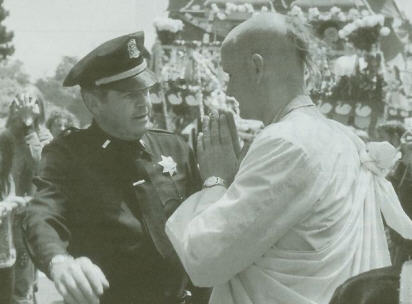I have a huge list, but it would be volumes so I will only list a couple for now (I might get back later).
The 24 Tirthamkaras and sign:
1.Bhagavân Rishabha Dev ( श्रीआदिनाथ ) bull
2.Bhagavân Ajitnath (श्रीअजितनाथ ) elephant
3.Bhagavân Sambhavanath (श्रीसंभवनाथ) horse
4.Bhagavân Abhinandananath(श्रीअभिनन्दननाथ)monkey
5.Bhagavân Sumatinath ( श्रीसुमतिनाथ) curlew
6.Bhagavân Padmaprabha (श्रीपद्मप्रभ) lotus
7.Bhagavân Suparshvanath (श्रीसुपार्श्वनाथ)swastika
8.Bhagavân Chandraprabha (श्रीचन्द्रप्रभ) moon
9.Bhagavân Pushpadanta(श्रीपुष्पदन्त ) Crocodile
10.Bhagavân Sitalanath (श्रीशीतलनाथ) Kalpavriksha
11.Bhagavân Sreyansanath (श्रीश्रेयांसनाथ) rhinoceros
12.Bhagavân Vasupujya (श्रीवासुपूज्य) female buffalo
13.Bhagavân Vimalanath (श्रीविमलनाथ) pig
14.Bhagavân Anantanath (श्रीअनन्तनाथ) Sehi (Porcupini)
15.Bhagavân Dharmanath (श्रीधर्मनाथ) Vajra
16.Bhagavân Santinath (श्रीशांतिनाथ) deer
17.Bhagavân Kunthunath (श्रीकुंथुनाथ ) goat
18.Bhagavân Aranath (श्रीअरहनाथ) fish
19.Bhagavân Mallinath (श्रीमल्लिनाथ) Kalasa
20.Bhagavân Munisuvrata (श्रीमुनिसुव्रनाथ] tortoise
21.Bhagavân Naminath (श्रीनमिनाथ) blue lotus
22.Bhagavân Neminath (श्रीनेमिनाथ) conch
23.Bhagavân Parshvanath (श्रीपार्श्वनाथ) snake
24.Bhagavân Mahavira (श्रीमहावीर)
Trailanga SwamI of Varanasi (1607 A.D. to 1887 A.D.)
Siddhartha Buddha
Ramalinga Swamigal (Vallalar)
Saint Jayananda Dasa (ISKCON Saint) San Francisco Temple between 1967-1977, b?-1977
Saint Visnujana Swami (ISKCON) San Francisco 1948–1976
Satguru Sant Keshavadas 1934 to 1997
The 63 Nayanars:
1 Sundarar
2 Tiru Neelakanta
3 Iyarpagaiar
4 Ilayankudi Maranar
5 Meiporul Chettinadu king
6 Viralminda
7 Amaraneedi
8 Eripatha
9 Enathinathar
10 Kannappa
11 Kungiliya Kalaya
12 Manakanchara
13 Arivattaya
14 Anaya
15 Murthi
16 Muruga
17 Rudra Pasupathi
18 Nandanar (Thirunalai Povar)
19 Tiru Kurippu Thonda
20 Chandeshvara most earliest Nayanar, who lived in Vedic period
21 Appar (Tirunavukkarasar)
22 Kulachirai
23 Perumizhalai Kurumba
24 Karaikkal Ammeiyar earliest Nayanar, woman saint who lived in the 6th century
25 Apputhi Adigal
26 Tiruneelanakka
27 Nami Nandi Adigal
28 Sambandar
29 Eyarkon Kalikama
30 Tirumular
31 Dandi Adigal
32 Murkha
33 Somasi Mara
34 Sakkiya former Buddhist
35 Sirappuli
36 Siruthondar Army general of the great Pallava king Narasimavarman I
37 Cheraman Perumal
38 Gananatha
39 Kootruva former Jain
40 Pugal Chola Chola monarch
41 Narasinga Muniyaraiyar
42 Adipaththar
43 Kalikamba
44 Kalia
45 Satti
46 Aiyadigal Kadavarkon
47 Kanampulla
48 Kari
49 Ninra Seer Nedumaara Pandya king, and former Jain
50 Mangayarkkarasiyar Queen, wife of Ninra Seer Nedumaara
51 Vayilar
52 Munaiyaduvar
53 Kazharsinga
54 Idangazhi
55 Seruthunai
56 Pugazh Thunai Chola commander
57 Kotpuli
58 Pusalar
59 Nesa
60 Sengenar (Kochengat Chola)
61 Tiru Nilakanta Yazhpanar
62 Isaignaniyaar Sundarar's mother
63 Sadaiya Sundara's father


